绍兴版九年级英语词法语法句法手册Unit6(讲解+习题+答案)
绍兴版九年级英语词法语法句法手册讲解+习题+答案

Unit 1How can we become good learners?词法精选1.aloud大声地;出声地(1)aloud作副词,意为“大声地;出声地”。
(2)aloud, loud 与loudly 的区别:aloud, loud和loudly都可以表示“大声地”,但在用法上有区别。
1)aloud和loud作副词时,都有“大声地;响亮地”的意思,有时可以通用。
但aloud 与read, think等动词连用时,强调“出声”,而loud通常只与talk, speak, shout, laugh等动词连用,且必须放在这些动词之后,在口语中可代替loudly。
如:①Please read the text aloud.请朗读一下课文。
②Speak louder, please, or no one will hear you.请大声些,否则没人能听见。
2)aloud只可用作副词,但loud还可用作形容词,意为“大声的;高声的”。
如:He has a loud voice.他嗓门大。
3)loudly也作副词,意为“响亮地”,其基本意义与loud相同,还常与ring, knock等动词连用。
loudly放在动词前后均可,含有“喧闹”或“嘈杂”的意味。
如:Suddenly the bell on the wall rang loudly.突然,墙上的铃大声地响起来。
2.patient(1)patient作形容词时,意为“有耐心的”。
如:Well, be patient. It takes time.请耐心,这需要花费时间。
常用结构:be patient with sb.,意为“对某人有耐心”。
如:Our math teacher is very patient with us.我们的数学老师对我们很有耐心。
(2)patient还可作名词,意为“病人”。
如:Please look after those patients for me.请帮我照顾好那些病人。
九年级英语unit6知识点梳理
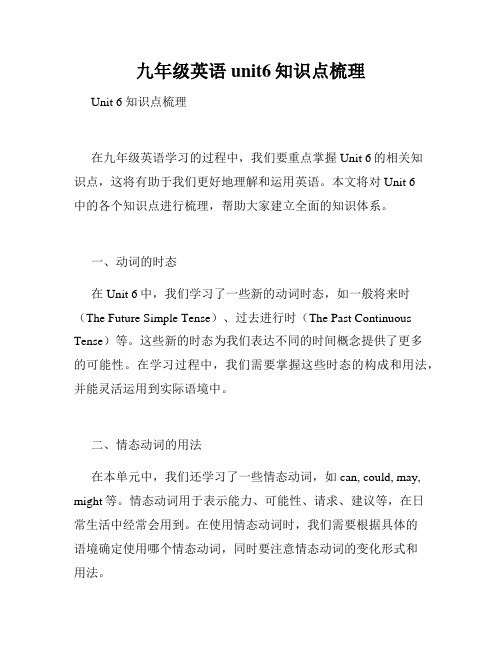
九年级英语unit6知识点梳理Unit 6 知识点梳理在九年级英语学习的过程中,我们要重点掌握Unit 6的相关知识点,这将有助于我们更好地理解和运用英语。
本文将对Unit 6中的各个知识点进行梳理,帮助大家建立全面的知识体系。
一、动词的时态在Unit 6中,我们学习了一些新的动词时态,如一般将来时(The Future Simple Tense)、过去进行时(The Past Continuous Tense)等。
这些新的时态为我们表达不同的时间概念提供了更多的可能性。
在学习过程中,我们需要掌握这些时态的构成和用法,并能灵活运用到实际语境中。
二、情态动词的用法在本单元中,我们还学习了一些情态动词,如can, could, may, might等。
情态动词用于表示能力、可能性、请求、建议等,在日常生活中经常会用到。
在使用情态动词时,我们需要根据具体的语境确定使用哪个情态动词,同时要注意情态动词的变化形式和用法。
三、非谓语动词除了时态和情态动词,本单元还介绍了非谓语动词的用法,包括不定式、动名词和现在分词等。
非谓语动词在句子中可以充当名词、形容词或者副词,使句子结构更加丰富。
我们需要掌握非谓语动词的构成和用法,并能在写作和阅读中准确地使用它们。
四、名词性从句名词性从句是英语中的一个重要知识点。
在本单元中,我们学习了名词性从句的三种类型:主语从句、宾语从句和表语从句。
名词性从句在句子中充当名词的角色,能够起到连接主从句的作用。
我们需要学会分辨和使用名词性从句,并能够根据具体的语境正确地运用它们。
五、冠词的用法冠词在英语中是一个重要的语法项目。
在Unit 6中,我们对定冠词(the)和不定冠词(a, an)进行了复习和扩展。
冠词的正确使用可以帮助我们准确表达自己的意思,同时也能够在阅读理解中帮助我们理解句子的含义。
因此,我们需要掌握不同场合下冠词的用法,并能够在实际运用中正确使用它们。
总之,Unit 6中的各个知识点对我们的英语学习都非常重要。
人教版九年级英语全一册:Unit 6 语法知识点复习提纲(含单元测试卷及答案全套)
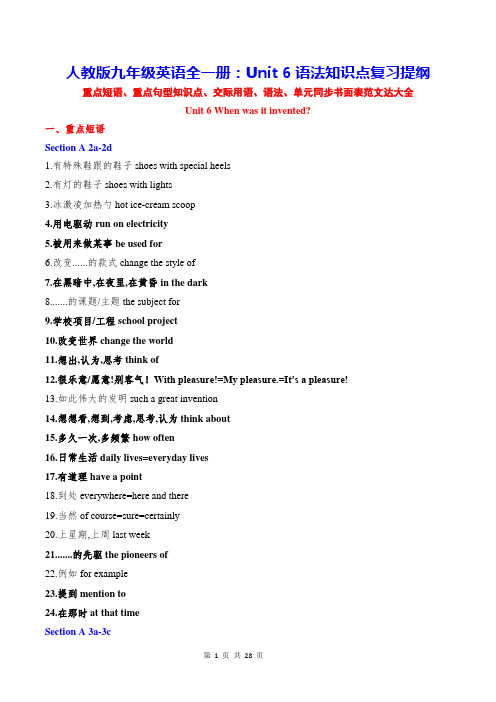
147.fall over被...绊倒
148.fall off跌落;从...掉下来
二、重点句型知识点
Section A
标题句型1.Whenwas it invented?它什么时候发明的?
一般过去时被动语态:主语+was/were+v-过去分词
48.发生take place
49.将茶的知名度传播到.....spread the popularity of tea to...
50.世界各地,全世界all over the world=around the world
51.虽然,即使even though/if
52.了解know about
53.毫无疑问without doubt(在肯定句中,其后接whether从句,在否定句和疑问句中,接that从句)
41.带到,带来bring to
42.在英格兰,在英国in England
43.茶树tea plants
44.最好的茶叶the finest tea leaves
45.不到,少于less than
46.国饮,全国性的饮料national drink
47.从中国到西方国家from China to Western countries
138.流行的in style
139.过时的out of style
140.中国少年先锋队the Young Pioneers
141.国宝national treasure
142.犯错,犯错误make mistakes
143.奥林匹克运动会the Olympics
浙江省绍兴县杨汛桥镇中学九年级英语全册 Unit 6 When was it invented Se
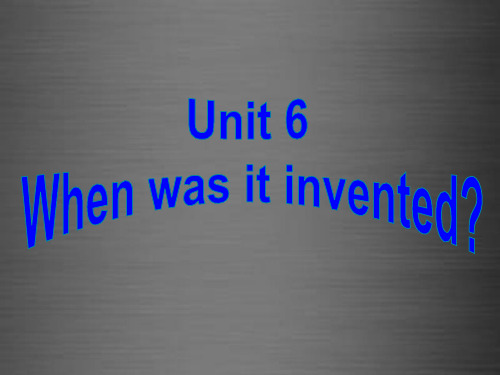
_u_n_d_e_r_s_ta_n_d_ (understand) the nature of tea.
3c Complete the sentences with the
correct forms of the verbs in the box.
invent, drink, bring, produce, trade
Shen Nong _w_a_s_b_o_i_l_in_g_ (boil) drinking water
v. 煮沸,烧开
n. 统治者,支配者
over an open fire. Some leaves from a tea plant _f_e_ll_ (fall) into the water and remained there for some time. It p__ro_d__u_c_ed_
2. How was tea invented? _It_w__a_s_i_n_v_e_n_t_ed__b_y__a_c_ci_d_e_n_t_. ___________
3. Who is called “the saint of tea”? _L_u_Y__u_. _______________n_._圣__人_,__圣_徒______
2. Who is the writer of Cha Jing? Lu Yu.
3a Read the passage quickly and
match each paragraph with its main idea.
Para. 1 Lu Yu and his book Cha Jing Para. 2 How tea spread to other countries Para. 3 How tea was invented by accident
九年级英语上册第六单元知识点讲解Grammar
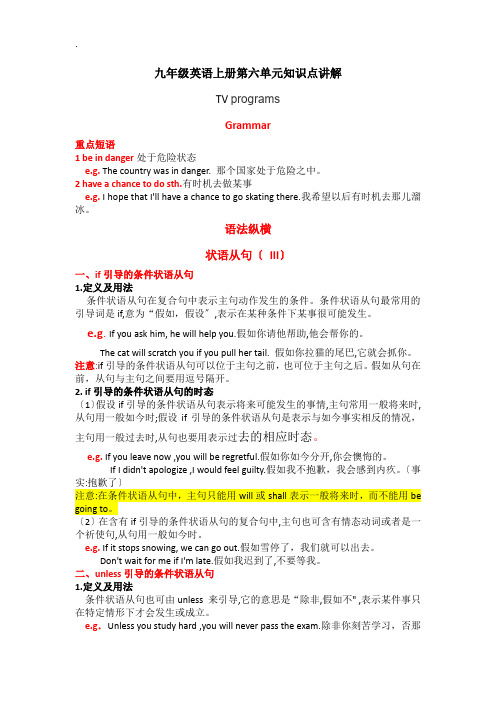
九年级英语上册第六单元知识点讲解TV programsGrammar重点短语1 be in danger处于危险状态e.g. The country was in danger. 那个国家处于危险之中。
2 have a chance to do sth.有时机去做某事e.g. I hope that I'll have a chance to go skating there.我希望以后有时机去那儿溜冰。
语法纵横状语从句〔III〕一、if引导的条件状语从句1.定义及用法条件状语从句在复合句中表示主句动作发生的条件。
条件状语从句最常用的引导词是if,意为“假如,假设〞,表示在某种条件下某事很可能发生。
e.g. If you ask him, he will help you.假如你请他帮助,他会帮你的。
The cat will scratch you if you pull her tail. 假如你拉猫的尾巴,它就会抓你。
注意:if引导的条件状语从句可以位于主句之前,也可位于主句之后。
假如从句在前,从句与主句之间要用逗号隔开。
2. if引导的条件状语从句的时态〔1〕假设if引导的条件状语从句表示将来可能发生的事情,主句常用一般将来时,从句用一般如今时;假设if引导的条件状语从句是表示与如今事实相反的情况,主句用一般过去时,从句也要用表示过去的相应时态。
e.g.If you leave now ,you will be regretful.假如你如今分开,你会懊悔的。
If I didn't apologize ,I would feel guilty.假如我不抱歉,我会感到内疚。
〔事实:抱歉了〕注意:在条件状语从句中,主句只能用will或shall表示一般将来时,而不能用be going to。
〔2〕在含有if引导的条件状语从句的复合句中,主句也可含有情态动词或者是一个祈使句,从句用一般如今时。
Unit6知识点汇 词法句法语法解析 人教版英语九年级全一册

人教版九年级全一册Unit6知识点汇+词法句法语法解析总重点短语:1. have a point 有道理2. by accident 偶然;意外地3. take place 发生;出现4. without doubt 毫无疑问;的确5. all of a sudden 突然; 猛地6. by mistake 错误地;无意中7. divide ... into 把⋯⋯分开8. look up to 钦佩;仰慕9. the style of ……的样式10. knock into 撞上(某人)11. in the way 这样12. since then 自从那以后13. travel around 周游14. all day 整天15. come up with 想出16. translate…into… 把……翻译成……17. over an open fire 在篝火上18. lead to 导致19. in the end=at last=finally 最后20. in my daily life 在我的日常生活中21. think of 想到;考虑22. It is said that 据说23. It is believed that 人们相信24. fall into=drop into 掉进25. at a low price 以很低的价格26. less than 少于;不到27. at that time 在那时28. at the same time 同时29. work on sth. 致力于某事30. (be)similar to 与……相似重点句型:1. Pens are used for writing.笔是被用来写的。
2. Tea was first drunk nearly 5,000 years ago. 茶第一次被饮用差不多是在五千年前。
3. It seems that many people all over the world drink Chinese tea. 好像世界上很多人都喝中国茶。
人教新目标英语九上 Unit 6知识点总结和重难点讲练 (有答案)
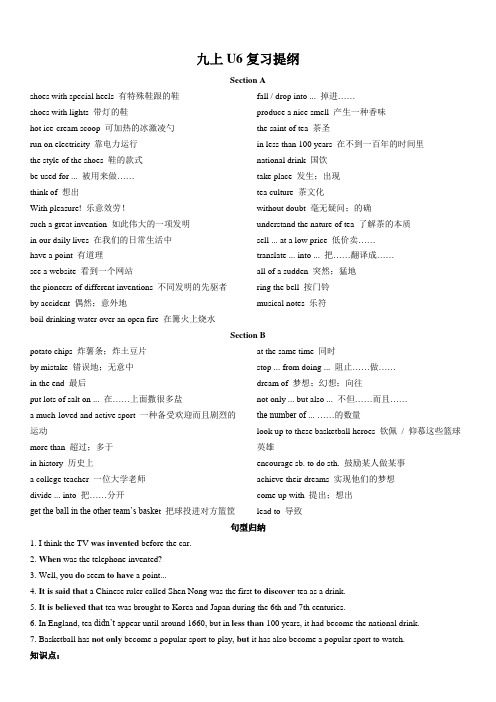
九上U6复习提纲Section Ashoes with special heels 有特殊鞋跟的鞋shoes with lights 带灯的鞋hot ice-cream scoop 可加热的冰激凌勺run on electricity 靠电力运行the style of the shoes 鞋的款式be used for ... 被用来做……think of 想出With pleasure! 乐意效劳!such a great invention 如此伟大的一项发明in our daily lives 在我们的日常生活中have a point 有道理see a website 看到一个网站the pioneers of different inventions 不同发明的先驱者by accident 偶然;意外地boil drinking water over an open fire 在篝火上烧水fall / drop into ... 掉进……produce a nice smell 产生一种香味the saint of tea 茶圣in less than 100 years 在不到一百年的时间里national drink 国饮take place 发生;出现tea culture 茶文化without doubt 毫无疑问;的确understand the nature of tea 了解茶的本质sell ... at a low price 低价卖……translate ... into ... 把……翻译成……all of a sudden 突然;猛地ring the bell 按门铃musical notes 乐符Section Bpotato chips 炸薯条;炸土豆片by mistake 错误地;无意中in the end 最后put lots of salt on ... 在……上面撒很多盐a much-loved and active sport 一种备受欢迎而且剧烈的运动more than 超过;多于in history 历史上a college teacher 一位大学老师divide ... into 把……分开get the ball in the other team’s baske t 把球投进对方篮筐at the same time 同时stop ... from doing ... 阻止……做……dream of 梦想;幻想;向往not only ... but also ... 不但……而且……the number of ... ……的数量look up to these basketball heroes 钦佩/ 仰慕这些篮球英雄encourage sb. to do sth. 鼓励某人做某事achieve their dreams 实现他们的梦想come up with 提出;想出lead to 导致句型归纳1. I think the TV was invented before the car.2. When was the telephone invented?3. Well, you do seem to have a point...4. It is said that a Chinese ruler called Shen Nong was the first to discover tea as a drink.5. It is believed that tea was brought to Korea and Japan during the 6th and 7th centuries.6. In England, tea didn’t appear until around 1660, but in less than 100 years, it had become the national drink.7. Basketball has not only become a popular sport to play, but it has also become a popular sport to watch.知识点:1. With pleasure! pleasure n. 高兴, 愉快with pleasure 高兴地my pleasure 我乐意e.g. She watched TV with .take in sth.\doing sth.很高兴做…… =It’s a to do sth.答案:pleasure pleasureI take great pleasure in studying with you.我非常高兴和你一起学习=It’s a great pleasure to study with you.【拓展】pleasant adj. 修饰物,令人满意的; pleased adj.修饰人,满意的please v. 使高兴; 使满意; 请2. Well, you do seem to have a point…嗯,看来你说的确实有道理……助动词do放在动词seem前面主要用来加强语气,“的确,确实”。
Unit6 Grammar Focus 课时练习(有答案) 人教英语九年级全册
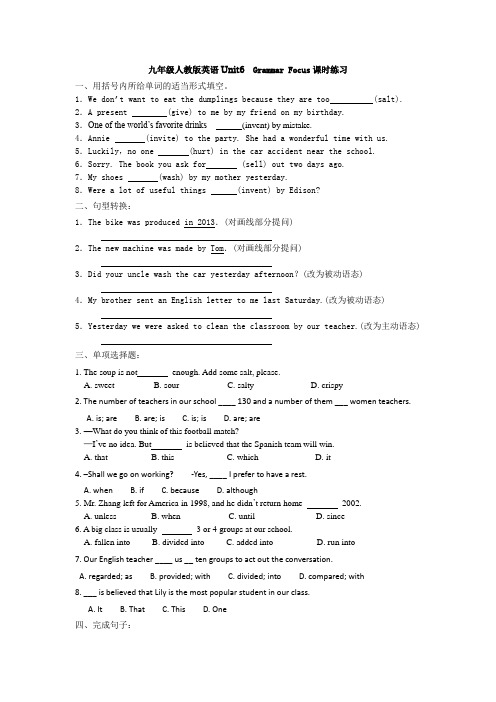
九年级人教版英语Unit6 Grammar Focus课时练习一、用括号内所给单词的适当形式填空。
1.We don’t want to eat the dumplings because they are too (salt). 2.A present (give) to me by my friend on my birthday.3.One of the world’s favorite drinks (invent) by mistake.4.Annie (invite) to the party. She had a wonderful time with us. 5.Luckily,no one (hurt) in the car accident near the school. 6.Sorry. The book you ask for (sell) out two days ago.7.My shoes (wash) by my mother yesterday.8.Were a lot of useful things (invent) by Edison?二、句型转换:1.The bike was produced in 2013.(对画线部分提问)2.The new machine was made by Tom.(对画线部分提问)3.Did your uncle wash the car yesterday afternoon?(改为被动语态)4.My brother sent an English letter to me last Saturday.(改为被动语态) 5.Yesterday we were asked to clean the classroom by our teacher.(改为主动语态)三、单项选择题:1. The soup is not enough. Add some salt, please.A. sweetB. sourC. saltyD. crispy2. The number of teachers in our school ____ 130 and a number of them ___ women teachers.A. is; areB. are; isC. is; isD. are; are3. —What do you think of this football match?—I’ve no idea. But is believed that the Spanish team will win.A. thatB. thisC. whichD. it4. –Shall we go on working? -Yes, ____ I prefer to have a rest.A. whenB. ifC. becauseD. although5. Mr. Zhang left for America in 1998, and he didn’t return home 2002.A. unlessB. whenC. untilD. since6. A big class is usually 3 or 4 groups at our school.A. fallen intoB. divided intoC. added intoD. run into7. Our English teacher ____ us __ ten groups to act out the conversation.A. regarded; asB. provided; withC. divided; intoD. compared; with8. ___ is believed that Lily is the most popular student in our class.A. ItB. ThatC. ThisD. One四、完成句子:1. 2021年奥运会将在日本东京举行。
绍兴版九年级英语词法语法句法手册Unit8(讲解习题答案)

Unit 8 It must belong to Carla.1.The hair band must belong to Linda.这个发带一定是琳达的。
belong to意为“属于”。
如:The car belongs to my uncle.这辆小汽车属于我叔叔。
这句话还可以说成:The car is my uncle's.这辆小汽车是我叔叔的。
当表述某物属于某人时,注意这两句的不同。
belong to后直接加人名或人称代词宾格,而第二句be动词后要用名词所有格形式或名词性物主代词。
如:①The book belongs to me.=The book is mine. 这本书是我的。
②The T-shirt belongs to Tom.=The T-shirt is Tom's. 这件T恤是汤姆的。
③Does the rabbit belong to your sister?=Is the rabbit your sister's? 这只兔子是你妹妹的吗?④Who does this coat belong to?=Whose coat is this? 这件上衣是谁的?2.the rest of+名词此短语意为“其余的;剩余部分的”,有时候直接用the rest。
如:While we clean the classroom, what will the rest of you do?我们打扫教室时,你们其余的人做什么呢?the rest短语作主语时,其谓语的单复数要根据the rest 所指的内容而定。
如:①Some students are on the playground, and the rest are s taying in the classroom. (指的是the rest of the students,谓语用复数)有些学生在操场上,而其余的待在教室里。
绍兴市第一中学初中英语九年级全册Unit 6知识点复习(答案解析)

一、选择题1.—Thank you very much for what you have done for me.—_________.A.Wait for a moment B.Good idea C.My pleasure D.Me too C解析:C【详解】句意:非常感谢你为我所做的。
—不客气。
A.意为“稍等一会儿”;B.意为“好主意”;C.意为“不客气”;D.意为“我也一样”。
由上句句意“非常感谢你为我所做的”可知,C项符合逻辑,故答案选C。
2.The little girl go into the room by some boys just now.A.is seen B.was seen C.is seen to D.was seen to D解析:D【解析】【详解】句意:这个小女孩儿刚才被一些男孩儿看到进入房间了。
根据句意可知,这里是被动语态,且有just now, 所以是一般过去时的被动语态;另外看到某人做了某事see sb do sth, 但是当它用于被动语态时,要还原to, 故选D。
3.He is the writer________won the Nobel(诺贝尔) Literature Prize.A.which B.whose C.who D.whom C解析:C【解析】【详解】句意:他是获得诺贝尔文学奖的作家。
考查定语从句。
A. which指物,当先行词是物,引导词which在定语从句中作宾语或主语;例如,The book which is on the table is mine.(作主语)B. whose指所有关系,在定语从句中作定语,它既可以指代人,也可以指代物,例如,They lives in a room whose window opens to the south.(他们住在一间窗户朝南开的房间里。
)C. who指人,当先行词是人,引导词who在定语从句中做主语或宾语;D. whom指人,当先行词是人,引导词who在定语从句中作宾语。
初中英语 Unit6用法汇总+词法句法语法总结及练习人教版九年级全一册
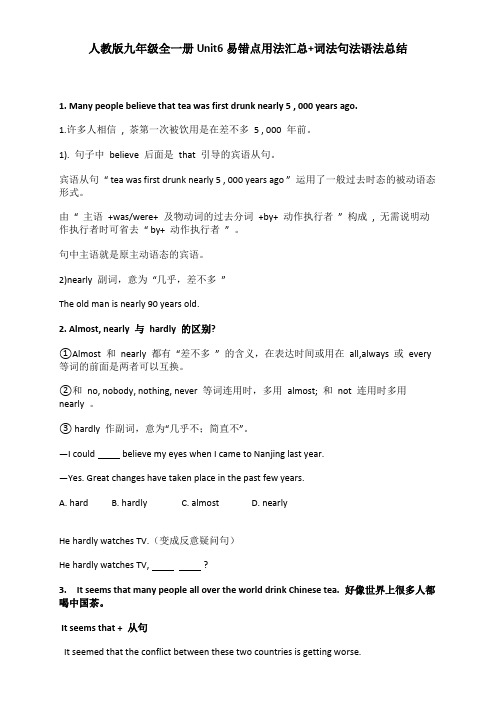
人教版九年级全一册Unit6易错点用法汇总+词法句法语法总结1. Many people believe that tea was first drunk nearly 5 , 000 years ago.1.许多人相信, 茶第一次被饮用是在差不多5 , 000 年前。
1). 句子中believe 后面是that 引导的宾语从句。
宾语从句“ tea was first drunk nearly 5 , 000 years ago ” 运用了一般过去时态的被动语态形式。
由“ 主语+was/were+ 及物动词的过去分词+by+ 动作执行者” 构成, 无需说明动作执行者时可省去“ by+ 动作执行者” 。
句中主语就是原主动语态的宾语。
2)nearly 副词,意为“几乎,差不多”The old man is nearly 90 years old.2. Almost, nearly 与hardly 的区别?①Almost 和nearly 都有“差不多” 的含义,在表达时间或用在all,always 或every 等词的前面是两者可以互换。
②和no, nobody, nothing, never 等词连用时,多用almost; 和not 连用时多用nearly 。
③ hardly 作副词,意为“几乎不;简直不”。
—I could believe my eyes when I came to Nanjing last year.—Yes. Great changes have taken place in the past few years.A. hardB. hardlyC. almostD. nearlyHe hardly watches TV.(变成反意疑问句)He hardly watches TV, ?3. It seems that many people all over the world drink Chinese tea. 好像世界上很多人都喝中国茶。
人教版九年级上册英语 Unit6 语法知识和练习
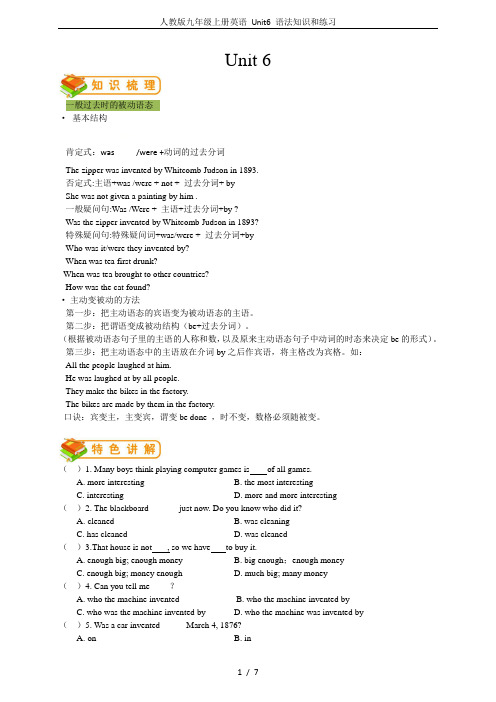
Unit 6一般过去时的被动语态·基本结构肯定式:was/were +动词的过去分词The zipper was invented by Whitcomb Judson in 1893.否定式:主语+was /were + not + 过去分词+ byShe was not given a painting by him .一般疑问句:Was /Were + 主语+过去分词+by ?Was the zipper invented by Whitcomb Judson in 1893?特殊疑问句:特殊疑问词+was/were + 过去分词+byWho was it/were they invented by?When was tea first drunk?When was tea brought to other countries?How was the cat found?·主动变被动的方法第一步:把主动语态的宾语变为被动语态的主语。
第二步:把谓语变成被动结构(be+过去分词)。
(根据被动语态句子里的主语的人称和数,以及原来主动语态句子中动词的时态来决定be的形式)。
第三步:把主动语态中的主语放在介词by之后作宾语,将主格改为宾格。
如:All the people laughed at him.He was laughed at by all people.They make the bikes in the factory.The bikes are made by them in the factory.口诀:宾变主,主变宾,谓变be done ,时不变,数格必须随被变。
()1. Many boys think playing computer games is of all games.A. more interestingB. the most interestingC. interestingD. more and more interesting()2. The blackboard ______ just now. Do you know who did it?A.cleanedB. was cleaningC. has cleanedD. was cleaned()3.That house is not , so we have to buy it.A. enough big; enough moneyB. big enough;enough moneyC. enough big; money enoughD. much big; many money()4. Can you tell me ____?A. who the machine inventedB. who the machine invented byC. who was the machine invented byD. who the machine was invented by()5. Was a car invented _____ March 4, 1876?A.onB. inC. atD. of解析:1. 介词短语of all games是表示“范围”的,在一定的范围内作比较,是用形容词的最高级。
初三Unit6-7知识点讲解和练习

初三Unit6-7知识点讲解和练习UNIT 6难点讲解:1.词形变化:1. invent v. 发明→n.invention 发明inventor 发明者V. + or = n. 这样的动词有:act , collect , visit , operate , translate2. accident n. 事故→ adj. accidental 意外的,偶然的3.smell v. 闻到→pt. / pp. smelt4. nation n. 国家,民族→ adj. national 国家的5.translate v. 翻译→ n. translation 翻译translator 翻译,翻译者6.sudden adj. 突然的→adv. suddenly 突然地7.music n. 音乐→adj. Musical活学活用:1. I go jogging for twenty minutes as my (day) exercise.2. The white building was once used as a home for the (rule) of the area.3. It is really my (please) to have a chance to work with you.4. Easter is not a (nation) holiday in China or Japan.5. Jenny’s very (music) and loves to sing.2. such adj. 如此的,这样的,用来修饰名词。
常用结构为:⑴such + a / an + adj. + 单数可数名词=so + adj. + a / an + 单数可数名词This is such a nice horse . 这是一匹如此好的马。
=⑵such + adj. + 复数可数名词There are such good books in the library .⑶such + adj. + 不可数名词She has made such great progress in the exam .3. pleased adj.高兴的,满意的be pleased with 对…高兴/ 满意I am pleased with your answer . 我对你的回答很满意。
Unit6SectionA【精品课】九年级英语全一册自学手册(人教版)含答案
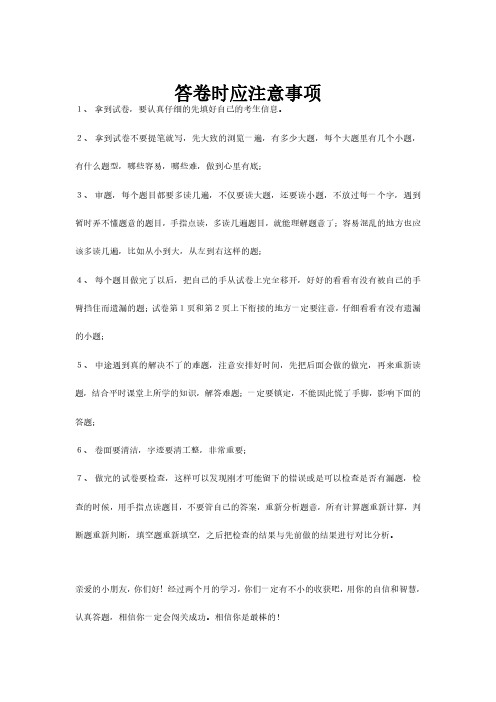
答卷时应注意事项1、拿到试卷,要认真仔细的先填好自己的考生信息。
2、拿到试卷不要提笔就写,先大致的浏览一遍,有多少大题,每个大题里有几个小题,有什么题型,哪些容易,哪些难,做到心里有底;3、审题,每个题目都要多读几遍,不仅要读大题,还要读小题,不放过每一个字,遇到暂时弄不懂题意的题目,手指点读,多读几遍题目,就能理解题意了;容易混乱的地方也应该多读几遍,比如从小到大,从左到右这样的题;4、每个题目做完了以后,把自己的手从试卷上完全移开,好好的看看有没有被自己的手臂挡住而遗漏的题;试卷第1页和第2页上下衔接的地方一定要注意,仔细看看有没有遗漏的小题;5、中途遇到真的解决不了的难题,注意安排好时间,先把后面会做的做完,再来重新读题,结合平时课堂上所学的知识,解答难题;一定要镇定,不能因此慌了手脚,影响下面的答题;6、卷面要清洁,字迹要清工整,非常重要;7、做完的试卷要检查,这样可以发现刚才可能留下的错误或是可以检查是否有漏题,检查的时候,用手指点读题目,不要管自己的答案,重新分析题意,所有计算题重新计算,判断题重新判断,填空题重新填空,之后把检查的结果与先前做的结果进行对比分析。
亲爱的小朋友,你们好!经过两个月的学习,你们一定有不小的收获吧,用你的自信和智慧,认真答题,相信你一定会闯关成功。
相信你是最棒的!人教版新目标九年级英语自学手册知识点解析+ 短语归纳+语法讲练+ 自我检测Unit 6 When was it invented?Section A知识点解析1. invent v.发明;创造(Page 41 1a)指创造出以前不存在的东西,尤指科技上的发明创造。
►—Do you know who invented the electric light bulb? 你知道是谁发明了电灯泡吗?—Edison. 爱迪生。
n.发明家)【助记】invent(v.(n.发明;发明物)【辨析】invent►Columbus discovered America in 1492. 1492年哥伦布发现了新大陆。
浙江绍兴一中初中英语九年级全一册Starter Unit 6阶段练习(含解析)
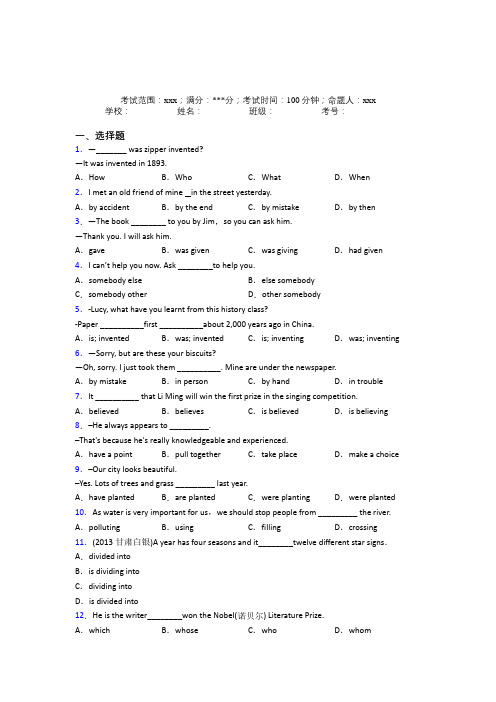
考试范围:xxx;满分:***分;考试时间:100分钟;命题人:xxx 学校:__________ 姓名:__________ 班级:__________ 考号:__________一、选择题1.—_______ was zipper invented?—It was invented in 1893.A.How B.Who C.What D.When2.I met an old friend of mine in the street yesterday.A.by accident B.by the end C.by mistake D.by then 3.—The book ________ to you by Jim,so you can ask him.—Thank you. I will ask him.A.gave B.was given C.was giving D.had given 4.I can’t help you now. Ask ________to help you.A.somebody else B.else somebodyC.somebody other D.other somebody5.-Lucy, what have you learnt from this history class?-Paper __________first __________about 2,000 years ago in China.A.is; invented B.was; invented C.is; inventing D.was; inventing 6.—Sorry, but are these your biscuits?—Oh, sorry. I just took them __________. Mine are under the newspaper.A.by mistake B.in person C.by hand D.in trouble 7.It __________ that Li Ming will win the first prize in the singing competition. A.believed B.believes C.is believed D.is believing 8.─He always appears to _________.─That's because he's really knowledgeable and experienced.A.have a point B.pull together C.take place D.make a choice 9.─Our city looks beautiful.─Yes. Lots of trees and grass _________ last year.A.have planted B.are planted C.were planting D.were planted 10.As water is very important for us,we should stop people from _________ the river. A.polluting B.using C.filling D.crossing 11.(2013甘肃白银)A year has four seasons and it________twelve different star signs.A.divided intoB.is dividing intoC.dividing intoD.is divided into12.He is the writer________won the Nobel(诺贝尔) Literature Prize.A.which B.whose C.who D.whom13.If you and your friend want a wrapped roast beef, a wrapped style chicken and two bottled drinks, you should pay _______.A.¥60 B.¥63 C.¥6614.—Trees can stop the wind ________ the earth away.—So it's good for us to plant more trees.A.blows B.blowing C.to blow D.blew15.—My zipper won't work. Could you help me repair it, Bill?—________A.Don't mention it. B.Sure, with pleasure.C.Never mind. D.It doesn't matter.16.Though lemon tastes __________, I still like it.A.crispy B.salty C.sour17.—Jane,what do you think of this orange?—Well,it's too ________.I can't stand it.A.sweet B.salty C.sour D.crispy18.— Listen! ______.—Oh, let’s go to the classroom.A.There goes the bell. B.There is a bell. C.There the bell go. 19.— Mum, I am hungry now. Is there in the fridge?— Sorry, there is nothing in the fridge.A.anything to drink B.anything to eatC.something to drink D.something to eat20.The Olympics _________ every four years. And the 29th Olympics _________ in Beijing in 2008.A.are taken place; take place B.take place; was heldC.hold; will be taken place D.are held; take place21.— Wow, the fruit so bad!—But I’m sure you'll like it after trying it.A.tasted B.smelled C.tastes D.smells 22.Very little of the house _________ now because it caught fire last week.A.remains B.is remaining C.is remained D.remained 23.Do not your personal information unless it is a safe website.A.give out B.give in C.give up D.give away 24.Look! These are ___________.A.me two rulers B.a ruler C.two ruler D.two rulers 25.It ________ that Donald Trump has been chosen as American president. A.says B.said C.is said D.saying 26.—Don't worry. I will look after your baby ________.—Thanks a lot.A.careful enough B.enough carefulC.carefully enough D.enough carefully【参考答案】一、选择题1.D2.A3.B4.A5.B6.A7.C8.A9.D10.A11.D12.C13.B15.B16.C17.C18.A19.D20.B21.D22.A23.A24.D25.C26.C【参考解析】一、选择题1.D解析:D【详解】句意:——拉链是什么时候被发明的?——它是在1893年被发明的。
- 1、下载文档前请自行甄别文档内容的完整性,平台不提供额外的编辑、内容补充、找答案等附加服务。
- 2、"仅部分预览"的文档,不可在线预览部分如存在完整性等问题,可反馈申请退款(可完整预览的文档不适用该条件!)。
- 3、如文档侵犯您的权益,请联系客服反馈,我们会尽快为您处理(人工客服工作时间:9:00-18:30)。
Unit 6When was it invented?1.I think the TV was invented before the car.我认为电视机是在小汽车之前被发明的。
(1)invent是动词,意为“发明”。
如:Bell invented the telephone. 贝尔发明了电话。
(2)invention是名词,意为“发明(不可数);发明物(可数)”。
如:This is one of Edison's inventions.这是爱迪生的发明之一。
(3)inventor是名词,意为“发明者;创造者”。
如:Edison is one of the greatest inventors in the world. 爱迪生是世界上最伟大的发明者之一。
(4)discover与invent的区别:discover意为“发现”,发现的对象是本来存在的;而invent意为“发明”,发明的对象是以前没有的新东西,如工具、手段或方法。
如:①Columbus discovered America in 1492.在1492年哥伦布发现了美洲。
②The telephone was invented in 1876.在1876年电话被发明了。
2.They're used for seeing in the dark.它们被用于在黑夜里观看。
(1)be used for意为“被用来做……”,介词for表示目的和用途,后面接名词或动词-ing。
如:①Sweaters are used for keeping warm.毛衣是用来保暖的。
②Wood can be used for making paper.木材可以被用来造纸。
(2)含有be used的其他常用短语:1)be used to do sth.意为“被用来做……”。
如:This machine is used to clean the wall.这台机器是用来清洁墙面的。
2)be used as意为“被用作……”,介词as意思是“作为”,其后一般接名词,强调使用的工具或手段。
如:This book can be used as a textbook.这本书可以当作教科书来用。
3)be used by意为“被……使用”,by后接动作的执行者。
如:This kind of machine is used by farmers for getting in crops.农民们用这种机器来收割庄稼。
3.Some leaves from a tea plant fell into the water and remained there for some time.一棵茶树上的一些树叶掉进了水里,并留在那里一段时间。
(1)fall into意为“落入;陷入”。
如:He fell into the river when he was crossing the bridge. 他在过桥时掉到了河里。
fall的其他搭配:fall down from=fall off,意为“从……掉下来”。
如:He fell down from his bike on his way home.他在回家的路上从自行车上掉了下来。
(2)remain作不及物动词,意为“剩下;停留;遗留”,不能用进行时态,也没有被动语态。
如:①Some of them have disappeared while others remain today. 它们中的一些已经消亡,然而另外一些今天仍然存在。
②The children remained out because of the fine weather.由于天气晴朗,孩子们继续待在室外嬉戏。
③When the others had gone, Joan remained to clean the room. 别人走了,琼留下来打扫房间。
④The Smiths remained there all through the year. 史密斯一家人在那里待了整年。
remain还可作系动词,意为“保持;仍然是;依旧是”,后接形容词、名词、动词不定式、现在分词、过去分词或介词短语作表语,指某人或某事物仍保持某种状态。
如:①He remained silent.他保持沉默。
(接形容词)②It remained a secret.这仍然是个秘密。
(接名词)③Many problems remain to be solved.有好多问题尚待解决。
(接动词不定式)1.I think the TV was invented after the car.我认为电视机是在小汽车之后被发明的。
(1)本句是复合句。
the TV...car是省略了that的宾语从句。
在此宾语从句中又包含了一个时间状语从句after the car (was invented),其中was invented被省略了。
(2)after作为连词时,引导时间状语从句,表示主句在从句动作之后发生,从句往往不用过去完成时,而用一般过去时。
如:After he finished all his homework, he went to bed. 完成所有作业之后,他就上床睡觉了。
after还可以作介词,意为“在……之后”,既可以用于过去时,也可以用于将来时。
如:①I will go abroad after next Sunday.我将在下周日之后出国。
②After six it began to rain.六点后,天就开始下雨了。
after作介词,其后还可直接加动词-ing。
如:After finishing the work, he went to bed.完成这项工作后,他就上床睡觉了。
2.Did you know that tea, the most popular drink in the world, was invented byaccident?你知道世界上最受欢迎的饮品——茶,是无意中发明出来的吗?the most popular drink in the world是tea的同位语,一个名词或其他形式,跟在另一个名词或代词后并对其进行解释、说明或限定,这个名词或其他形式就是同位语。
如:Mr. Smith, our new teacher, is very kind to us.我们的新老师史密斯先生对我们很和善。
3.It is believed that tea was brought to Korea and Japan during the 6th and 7th centuries. 人们相信茶是在6世纪和7世纪被带到朝鲜和日本的。
It is believed that...相当于People believe...,后面跟that引导的主语从句。
如:It is believed that by the year 2020, the population of the world will be seven billion.=People believe that by the year 2020, the population of the world will be seven billion.人们都认为到2020年,世界人口将达到七十亿。
4.Basketball has not only become a popular sport to play, but it has also become a popular sport to watch. 篮球不仅成了一种受欢迎的体育运动,同时也成了受欢迎的体育节目。
not only...but also...意为“不但……而且……”,在句中常用来连接两个对等的成分,also 可以省略。
如:She speaks Russian not only in class but (also) at home. 她不仅在课堂上而且在家里都讲俄语。
not only... but (also)...用来连接两个主语时,谓语动词的单复数遵循“就近原则”,即和but (also)后的名词或代词的数保持一致。
如:①Not only Zhou Xia but also her parents are fond of watching football matches.不仅是周霞而且她的父母都喜欢看足球比赛。
②Not only you but also he is tired of having one examination after another.不仅是你而且他也讨厌一次接一次的考试。
被动语态(二)一般过去时的被动语态一般过去时的被动语态是由“was/were+动词的过去分词”构成。
如:①He invented the telephone in 1876.→The telephone was invented (by him) in 1876.②Sam didn't find the book when he came into the room.→The book wasn't found by Sam when he came into the room.③They agreed on the building of a new car factory last month.→The building of a new car factory was agreed on last month.④The students didn't forget his lessons easily.→His lessons were not forgotten by the students easily.【注意】(1)用直接宾语作被动语态的主语时,通常要在间接宾语前加上适当的介词。
如:①He sent me a photo yesterday.→A photo was sent to me (by him) yesterday.②Her father bought her a nice hat.→A nice hat was bought for her (by her father).(2)某些动词,如:let, see, make, hear, watch, notice等在主动结构中作谓语,后可接不带to的动词不定式作为宾语补足语。
但在变为被动语态时,省略的动词不定式符号to要还原。
如:①I saw him run out of the classroom.→He was seen to run out of the classroom (by me).②The man often makes his son do exercise.→His son is often made to do exercise (by the man).(3)某些不及物动词与介词或副词搭配构成动词短语,如:look after, take care of, cut down, laugh at, talk about, turn on, listen to, put off等,后可接宾语,但变被动语态时应把动词短语看作一个整体,短语中的介词或副词不可省略。
